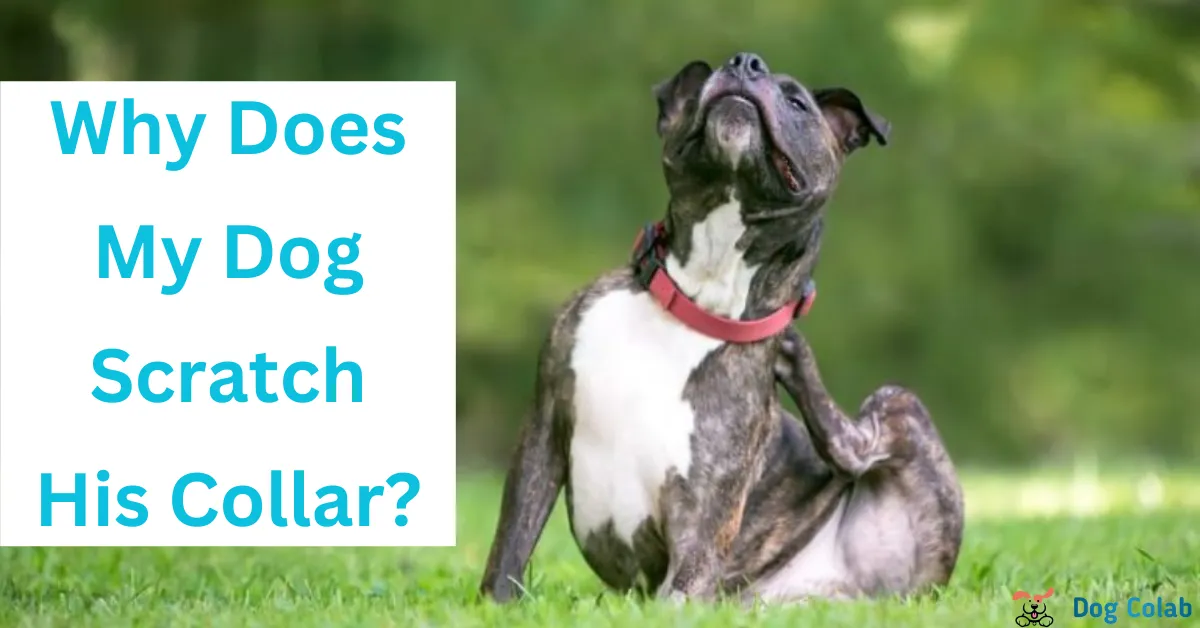If you’re a dog owner, you’ve likely observed your furry friend engaging in various behaviors, some of which may seem curious or even perplexing. One such behavior is your dog scratching neck collar. Dogs are highly communicative creatures, and their actions often convey important messages.
When your dog scratching neck collar, it could indicate a range of reasons, from discomfort or irritation to a desire for attention or a means of self-soothing. So, In this blog post, we will discuss the reasons behind why does my dog scratch his collar and effective ways to address and prevent this behavior.
Understanding Dog Scratching Behavior

Dogs communicate in various ways, and scratching is one of their natural instincts to convey different messages. While scratching the collar might be a specific behavior, it is essential to consider it within the broader context of your dog’s body language and vocalizations.
Why Does My Dog Scratch His Collar? (8 Reasons)
There are several reasons why do dogs scratch their collar.
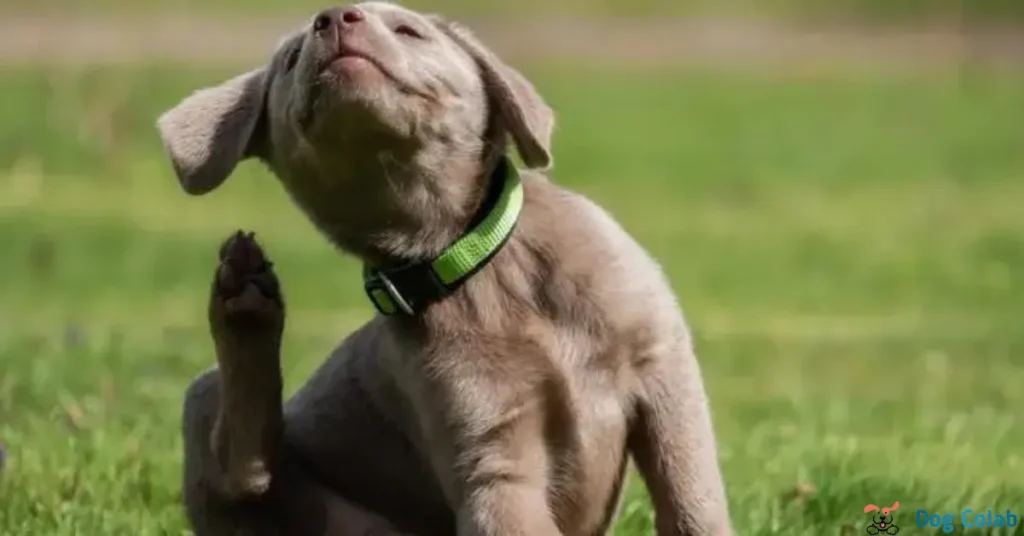
1. Skin Irritation or Allergies
Some dogs may have sensitive skin or allergies to certain materials used in collars, such as nylon, leather, or metal. The constant contact between the collar and the neck can lead to redness, itchiness, and discomfort, prompting the dog to scratch.
2. Incorrect Collar Size or Fit
If the collar is too tight or too loose, it can cause irritation and rubbing against the skin. A collar that is too tight can chafe and create sores, while a loose dog collar may move around excessively, leading to discomfort and itchiness.
3. Parasites
Fleas, ticks, and mites are common external parasites that can infest a dog’s neck area. These pests can cause intense itching and irritation, leading the dog to scratch not only its neck but also other parts of its body.
4. Anxiety and Stress
A dog keeps scratching its neck or collars when feeling anxious or stressed. Anxiety triggers can vary, such as being left alone, encountering new environments, or loud noises. Scratching becomes a self-soothing mechanism for them in such situations.
5. Fungal or Bacterial Infections
If there is an underlying fungal or bacterial infection on the skin, the area around the collar can become inflamed and itchy. Scratching can worsen the condition and lead to further irritation.
6. Dermatitis
Contact dermatitis can occur when your dog’s skin reacts negatively to certain substances, such as cleaning products, shampoos, or even the materials in the collar. Puppy keeps scratching neck may result from the discomfort caused by this skin reaction.
7. Boredom or Habitual Behavior
Some dogs may develop the habit of scratching their collars out of boredom or as repetitive behavior, even if there is no underlying health issue.
8. Hot or Humid Weather
During hot and humid weather, dogs may scratch more due to sweating and moisture accumulation around the neck area.
Can A Collar Make A Dog Itch?
Yes, a collar can make a dog itch. Collars, especially those made of certain materials, can cause skin irritation and discomfort in dogs. The constant contact between the collar and the sensitive skin on the neck can lead to redness, inflammation, and itchiness. Common collar materials like nylon, leather, and metal can be potential culprits for causing allergic reactions in some dogs.
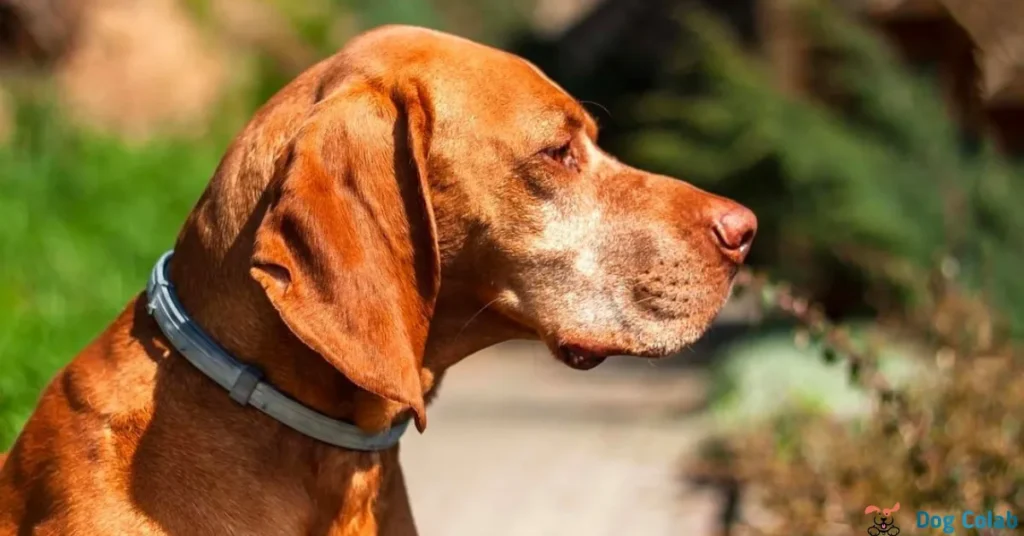
Allergies to collar materials are similar to human skin allergies to certain fabrics or metals in jewelry. When a dog with sensitive skin wears a collar made from a material to which they are allergic, it can trigger an immune response, resulting in itchiness and discomfort. This allergic reaction can manifest as scratching, rubbing the neck on the ground, or even chewing on the collar itself.
Additionally, if the collar is too tight or not fitted properly, it can create friction against the skin, leading to irritation and itchiness. Dogs may scratch excessively in an attempt to alleviate the discomfort caused by the ill-fitting collar.
Can Dogs Be Allergic To Their Collars?
Yes, dogs can be allergic to their collars. Allergic reactions occur when a dog’s immune system identifies certain collar materials as harmful, triggering an inflammatory response.
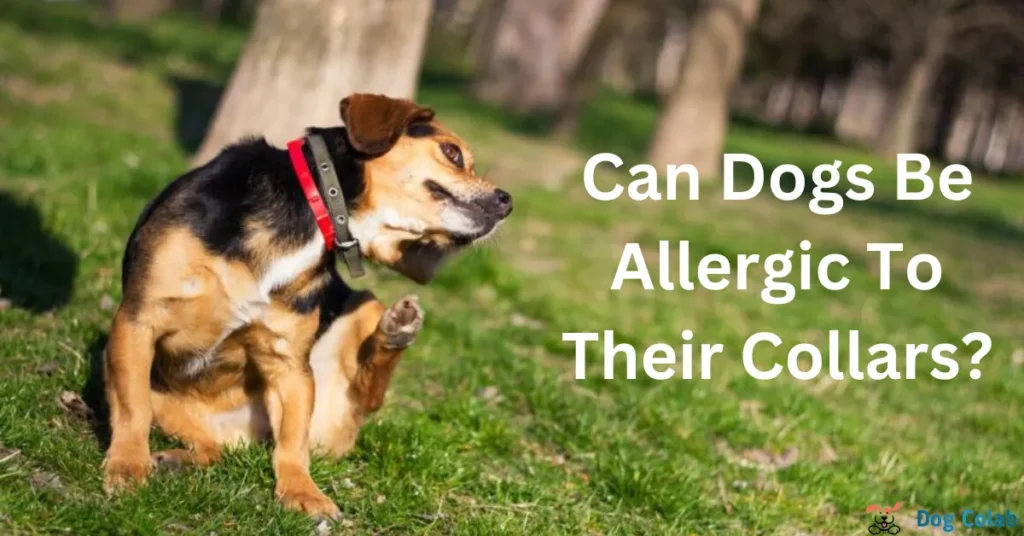
Symptoms of a collar allergy may include excessive scratching or rubbing of the neck, red and inflamed skin, hair loss, and even skin infections. It’s essential to recognize these signs and take prompt action to address the issue.
To alleviate collar-related allergies, consider using hypoallergenic collars made from materials less likely to trigger reactions. Switching to collars made from natural fibers like cotton or opting for specialized hypoallergenic materials can be beneficial. Regularly clean the dog collar to remove any potential irritants and ensure it fits comfortably without chafing or rubbing against the skin.
You may also be interested in:- How tight should my dog’s collar be.
How To Identify Why Does My Dog Keep Scratching His Collar
Identifying the reason why your dog keeps scratching neck requires careful observation and consideration of various factors. Here are steps you can take to help determine the cause.

1. Examine the Collar
Inspect the collar for any signs of wear, rough edges, or tightness. Ensure it is the appropriate size for your dog and fits comfortably. Look for any debris or irritants caught in the collar that may be causing discomfort.
2. Check For Skin Irritation
Carefully examine your dog’s neck area for redness, rashes, sores, or signs of skin irritation. Look for hair loss, scabs, or any unusual bumps or lumps.
3. Rule Out Parasites
Thoroughly check your dog’s neck and surrounding areas for signs of fleas, ticks, or mites. Look for tiny insects or black specks (flea dirt) that indicate a parasitic infestation.
4. Consider Allergies
If the scratching is persistent and not limited to the collar area, allergies could be the culprit. Observe if your dog exhibits other signs of allergies like sneezing, watery eyes, chewing paws, or gastrointestinal issues. Allergies can be caused by collar materials, environmental factors, or food.
5. Observe Behavior and Triggers
Pay attention to when your dog scratches his collar. Is it during certain activities, environments, or times of the day? It may be triggered by anxiety, stress, boredom, or specific situations that cause discomfort.
6. Consult a Veterinarian
If you cannot identify the cause of why does my dog itch his collar, it is advisable to seek veterinary advice. A veterinarian can conduct a thorough examination, perform tests if necessary, and help pinpoint the underlying cause of the scratching.
Recommended Also Read:- Should dogs wear collars all the time.
Address the Issue of Why Is My Puppy Scratching His Collar
Once you have identified the reason behind your dog’s collar scratching, it’s time to address the issue and find a suitable solution. The following approaches can be beneficial.
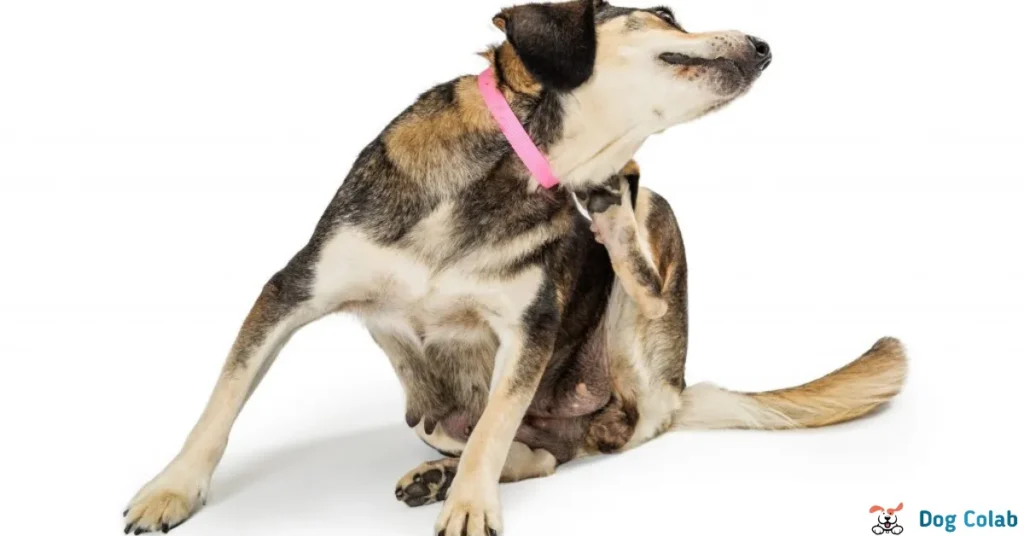
1. Ensuring Proper Collar Fit and Material
Make sure your dog’s collar fits comfortably, allowing room for two fingers to fit between the collar and the neck. Consider using collars made from soft and hypoallergenic materials to reduce irritation.
2. Using Alternatives to Collars
Some dogs may benefit from using harnesses or head halters instead of collars, especially if they have respiratory issues or neck sensitivity.
3. Addressing Behavioral Factors
If anxiety or stress is the primary cause of your dog’s scratching, consult a professional dog trainer to develop a behavior modification plan. Positive reinforcement training and desensitization techniques can help alleviate their anxiety.
4. Potential Medical Interventions
If your dog keeps scratching its neck due to allergies or skin conditions, consult your veterinarian for appropriate treatment options. They may recommend antihistamines, topical ointments, or dietary changes.
Reading Tip:- Why does my dog want his collar on.
Dog Scratching Neck Collar Preventive Measures
To prevent your dog from scratching his collar and promote overall well-being, consider implementing the following preventive measures.
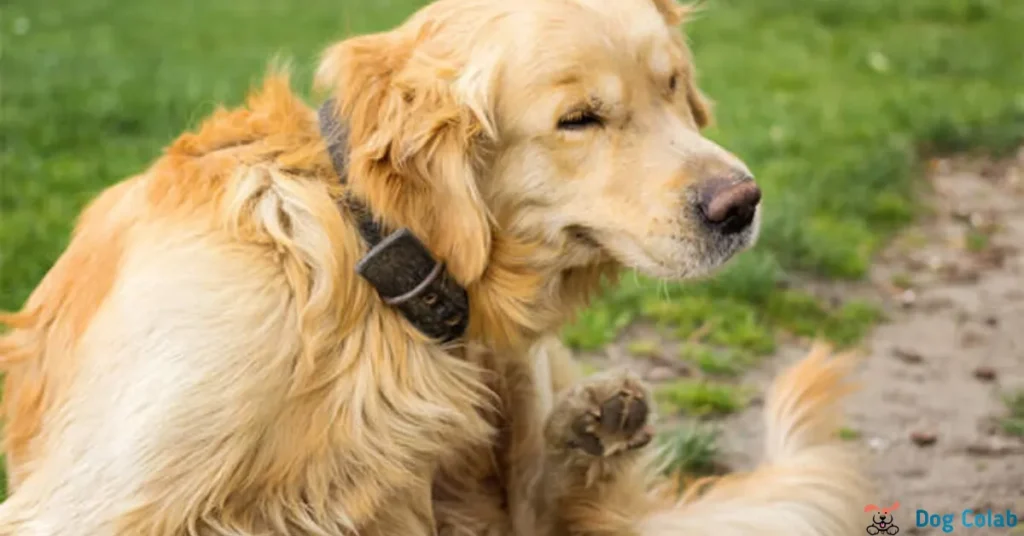
- Proper Collar Fit: Ensure the collar is the right size and adjusted correctly. Regularly check the dog collar fit as your dog grows or if they gain/lose weight.
- Hypoallergenic Collars: If your dog has shown signs of collar allergies, switch to hypoallergenic collars made from materials less likely to trigger reactions.
- Regular Cleaning: Keep the collar clean by washing it regularly to remove dirt, sweat, and potential irritants.
- Flea and Tick Prevention: Administer regular flea and tick preventive treatments to protect your dog from external parasites that cause itching and discomfort.
- Grooming: Regularly groom your dog to keep their coat clean and free from tangles, which can reduce the likelihood of irritation around the collar area.
- Alternative Collar Types: Consider using harnesses instead of collars for dogs prone to skin issues or those who pull on the leash, as harnesses distribute pressure more evenly.
- Collar-Free Time: Give your dog collar-free breaks during times when they don’t require it, like when they are indoors or under direct supervision.
- Stress Reduction: Minimize stressful situations and provide a safe and comfortable environment for your dog. Consider behavioral training or calming techniques to reduce anxiety.
- Environmental Control: Identify and remove potential allergens from your dog’s living area, such as certain cleaning products or plants.
- Regular Veterinary Check-ups: Schedule routine check-ups with your veterinarian to monitor your dog’s health and address any issues promptly.
Recommended Also Read:- Should my dog sleep with his collar on.
Conclusion “Why Does My Dog Scratch His Collar”
In conclusion, there are various reasons why your dog may scratch his collar. Skin irritation or allergies, incorrect collar size or fit, parasites, anxiety, infections, and even habitual behavior can contribute to this behavior.
As a responsible pet owner, understanding the potential causes is essential in providing appropriate care and addressing any discomfort your furry companion may be experiencing.
Regular monitoring, proper collar selection, and seeking veterinary advice when needed will ensure your dog’s collar-wearing experience remains comfortable and itch-free, allowing them to lead a happy and healthy life.
NOTE:- More information can be found by clicking this link.
FAQs
1. Is it normal for a dog to scratch with a collar on?
When a collar is first put on a puppy, it’s normal for them to scratch, bite, circle, or resist walking since they’re not used to it.
2. Why is my dog constantly scratching at his collar?
If your dog is scratching at his collar, check for tightness. If it’s fine, distract him with a toy to redirect his attention. Let him adjust to wearing it over time.
3. Do dogs get irritated by collars?
Some dogs may get irritated by collars as they can feel restricted and uncomfortable, leading them to paw at or try to remove them.
4. How do I know if my dog is allergic to his collar?
Observe your dog for signs like lesions, skin irritation, redness, and fur loss around the collar area. If present, consult a veterinarian to check for allergies.
